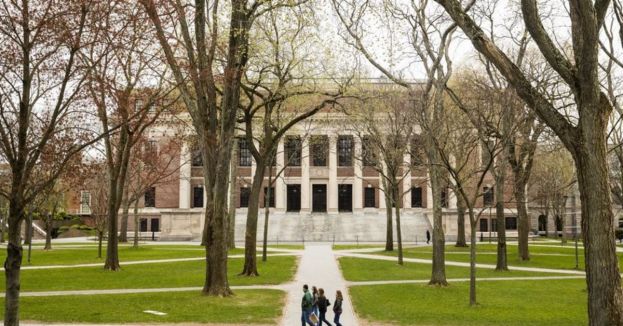The High Court said it would take up lawsuits claiming that Harvard University, a private institution, and the University of North Carolina, a state school, discriminate against Asian American applicants.
The suits claim that affirmative action gives African Americans, Hispanics, and Native Americans an edge over Asian students.
A decision against the schools could suggest the end of affirmative action in college admissions.
The Supreme Court is adding affirmative action to a slate of cases already politically charged with issues concerning abortion, guns, religion, and COVID-19 on the docket.
WATCH: DESANTIS ON WHY STUDENT LOAN FORGIVENESS IS UNCONSTITUTIONAL![]()
Its choice to take up the case was touted by Republicans in Congress but slammed by others who say canceling affirmative action removes a fence against inequality.
White House Press Secretary Jen Psaki refused to comment on those cases when asked to at her daily press briefing on Monday, but said: "We strongly believe, this administration, in the benefits of diversity in higher education and we take very seriously our commitment to advancing equity and equal opportunity for historically underserved populations."
WATCH: REMEMBER SNL TIM MEADOWS AS OJ SIMPSON?![]()
Lower courts had previously denied the challenges to admissions practices, mentioning more than 40 years of Supreme Court rulings that allow colleges and universities to ponder race in admissions decisions. But the colleges and universities must do so in a slightly tailored way to encourage diversity.
WHEN SHADOW WARS COME TO LIGHT: IRAN-ISRAEL CONFLICT PLAYS OUT ON THE WORLD STAGE![]()
The last time the issue came before the Court was in 2016 when justices ruled in favor of the University of Texas and its admissions program in a 4-3 decision. That case had been brought by a white woman.
But the Court has experienced a massive change since then that's seen three Conservative justices appointed to the bench by Donald Trump.
UNMASKING THE HELLS ANGELS: ATF AGENT BREAKS SILENCE ON TWO-YEAR UNDERCOVER MISSION![]()
Two members of 2016's four-justice majority are gone from the Court: Justice Ruth Bader Ginsburg died in 2020, and Justice Anthony Kennedy quit in 2018.
The three dissenters in the case, Chief Justice John Roberts and Justices Clarence Thomas and Samuel Alito, remain on the Court.
HEART-STOPPING ACT OF VALOR: AUSTRALIAN COP'S DRAMATIC SHOWDOWN WITH KNIFEMAN![]()
Roberts, who's been known to side with the Liberal justices on occasion as a moderating influence on the Court, has also criticized using race as a major factor in public programs.
"It is a sordid business, this dividing us up by race," he once wrote.
OUTRAGE IN CHICAGO: FAR-LEFT RALLY CHEERS FAILED IRANIAN ASSAULT ON ISRAEL (WATCH)![]()
GOP Senator Tom Cotton called on the High Court to end what he calls Ivy Leagues' "discrimination" against Asian American students.
"Schools like Yale and Harvard use affirmative action to systematically discriminate against Asian American applicants. The Court should strike down these unconstitutional policies," Cotton wrote on Twitter Monday. His fellow Republican lawmaker, Rep. Michelle Steel of California, hailed the justices for taking up the case.








 Discover alternative ideas that will make you think
Discover alternative ideas that will make you think Engage in mind bending debate
Engage in mind bending debate Earn points, rise in rank, have fun
Earn points, rise in rank, have fun


